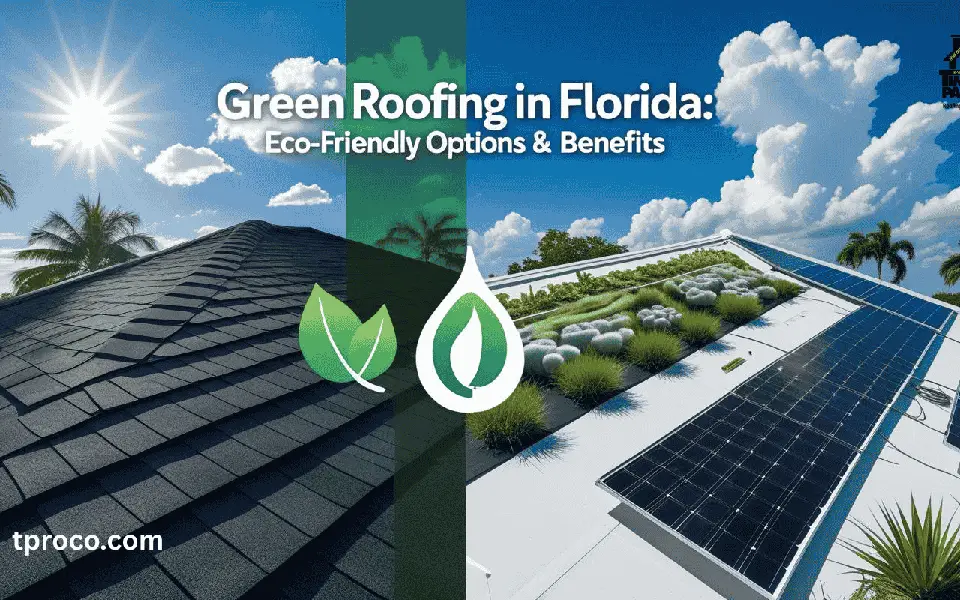Our Blogs
Florida Gutter Innovations: Styles & Upgrades to Protect Your Home 🌦️
Many Florida homeowners skip or overlook gutters, assuming heavy rains just roll off the eaves. But ignoring gutter systems can foster foundation erosion, soil washout, or water intrusion near your home’s base—risking cracks, mold, or even flooding. With Florida’s intense storms and coastal humidity, your gutter choice isn’t trivial: do you choose seamless aluminum or a more stylish copper? What about gutter guards to prevent leaf clogs? And how do you ensure the system can handle Florida’s torrential downpours? This blog explores gutter innovations that protect your landscaping, foundation, and siding from the Sunshine State’s infamous monsoon rains. We’ll weigh pros, cons, and new add-ons like mesh covers or splash blocks to keep your property safe. If you’re rethinking your water drainage, read on for a thorough Florida gutter guide—time to banish those puddles and protect your biggest investment.

1. Why Gutters Matter in Florida’s Climate
While some Florida houses forego gutters, consider key reasons for installing or upgrading:
- Foundation & Slab Protection: Concentrated runoff can erode soil or seep under the slab, weakening footings. In a state with frequent thunderstorms, that’s a recipe for cracks or settling.
- Siding & Paint Preservation: Constant water sheeting down walls fosters mildew, rot, or paint peeling. Gutters guide water away, lessening the beating on your exterior.
- Landscaping & Garden Defense: If flower beds or shrubs hug your home, roof runoff can wash away soil or swamp roots. A gutter system channels water to a safe spot or into drainage lines.
- Less Splashback & Staining: If you have a pool deck or walkway near your eaves, gutters prevent that annoying splash or algae-laden drip lines.
Florida’s thunderstorms can dump inches of rain in an hour, so every minute that water pours off unprotected eaves, your home’s foundation is at risk. Even in older neighborhoods that historically skipped gutters, adding them can save on future repairs—especially with Florida’s rising storms and potential for localized flooding.
2. Seamless vs. Sectional Gutters: A Quick Overview
Gutters typically come in two main styles:
Seamless Gutters:
-
- Pros: Custom-fabricated on-site from a single roll of aluminum or copper. Fewer seams means fewer leak points. Smooth, clean aesthetic. Great for Florida’s heavy rain since there are no mid-span joints that can fail.
- Cons: Must be installed by a gutter pro with specialized machinery. Typically more expensive upfront than sectionals. Harder to self-repair if a portion is damaged.
Sectional Gutters:
-
- Pros: DIY-friendly. Sold in standard lengths at hardware stores. Cheaper initial cost. Easy to replace a small section if bent or rusted.
- Cons: Multiple seams can fail over time, especially under Florida’s humidity and salt air. More potential for leakage or sagging.
For Florida homeowners who want durability and minimal leaks, seamless is often the gold standard. The custom lengths reduce joint stress, crucial when downpours fill gutters quickly. However, if you’re on a tight budget or prefer a small DIY approach, sectional vinyl or aluminum can work fine as long as you maintain seals and alignment. Evaluate the size of your roof, rainfall volume, and the longevity you want from your gutter system.
3. Material Choices: Aluminum, Copper & More
Material selection matters for style, rust resistance, and cost:
- Aluminum: Most popular in Florida thanks to lightweight, corrosion-resistant properties. Seamless aluminum is widely available with baked-on paint finishes. Usually a cost-effective, long-term solution.
- Copper: Premium choice for an upscale, classic look. Patinas over time to a greenish hue if not sealed. Resists rust exceptionally well. High initial cost and potential for theft.
- Vinyl: Budget-friendly, sold as sectional pieces. However, Florida’s intense sun can make vinyl brittle over time, risking cracks or sagging.
- Galvanized Steel: Strong but can rust in Florida’s salt air if the coating is compromised. Not as common as aluminum for long-term.
Most Florida homeowners pick aluminum for its solid balance of durability and affordability. If you want a “statement” gutter on a high-end or historic home, copper adds an elegant flair. Just be mindful that copper can react with certain roofing materials or salts, so confirm compatibility. Regardless of metal type, ensuring the gauge or thickness meets Florida wind-lift demands is crucial for hurricane readiness.
4. Sizing & Downspout Placement: Handling Florida Downpours
Oversized or properly placed downspouts are key in Florida’s torrential rains:
- K-Style Gutters (5-inch vs. 6-inch): Many Florida homes use 6-inch to handle heavier volumes. The bigger trough prevents overflow during sudden storms.
- Downspout Dimensions: Upgrading to 3×4 inch downspouts (instead of 2×3) helps water exit faster, reducing backup. This is especially important if your roof is large or multi-story.
- Number of Downspouts: Adding extra spouts for a long gutter run is wise if you frequently see overflow. Florida storms can overwhelm a single downspout on 40+ feet of gutter.
- Extension or Underground Drains: Directing downspouts well away from the foundation is crucial. If your yard is flat, consider underground drain lines or pop-up emitters to route water to a safe distance.
Under sizing is a common mistake. Florida’s short, intense rain bursts might easily overflow standard 5-inch gutters if the roof is big. Work with your installer to calculate the square footage of your roof area and pick a gutter size/ downspout arrangement that can handle peak flow. This is especially relevant if your home’s pitch funnels heavy volumes into one corner.
5. Gutter Guards & Leaf Solutions
Clogged gutters are worthless during a Florida downpour:
Mesh Screens or Micro-Mesh Guards:
Fine screens that block leaves, pine needles, or small debris. Great for Florida oaks or palm fronds. Must be installed correctly to avoid water sheeting over the guard.
Foam Inserts:
A porous foam wedge that sits in the gutter, letting water through while catching debris. However, Florida’s humidity can lead to algae growth inside the foam if not maintained.
Reverse-Curve Guards:
Curved metal or plastic that guides water in but sloughs leaves off the outer edge. They work, but heavy downpours can cause overshoot if not sized properly.
Guards reduce cleaning frequency but aren’t always maintenance-free. Florida’s storms blow in finer debris or palm seeds that might slip through. A quick rinse or check each season ensures your guards aren’t clogged. Also, for the best performance, pick a guard design tested for high-volume rain—some “cheap” guards cause waterfalls in heavier storms, defeating the gutter’s purpose. If you have large oak trees or frequent leaf drop, gutter guards can be a game-changer for preventing clogs and nasty algae buildup.
Conclusion
In Florida, installing or upgrading gutters is more than a small finishing touch—these channels guide heavy tropical rains away from your home’s foundation, siding, and landscaping. Whether you choose seamless aluminum or a more upscale copper system, sizing and placement matter if you want to handle intense downpours. Pairing 6-inch gutters with enlarged downspouts, plus gutter guards, sets you up for minimal clogs and maximum water flow. By investing in robust materials and ensuring a careful installation—nailing hangers properly, sealing joints, and routing outflow far from your slab—you reduce erosion, keep your exterior paint fresh, and maintain a healthier foundation in Florida’s challenging climate. With the right approach, your new gutter setup becomes an invisible hero, quietly protecting your home from the storms overhead.
Frequently Asked Questions (FAQ)
🌦️ Florida Gutters Matter More Than You Think — Is Your Home Protected?
Don’t let Florida’s heavy rains damage your foundation! The right gutter system—seamless aluminum, guards, and smart drainage add-ons—can protect your home for years.
#tproco #tppro #tprci #urro #rrfl
#FloridaGutters #Seamless #RainReady #TampaHomes #OrlandoDrainage #SunshineState
About the Author

Timothy Parks
CEO
📢 Stay Informed: Communication & Consent Updates
At Timothy Parks Roofing & Construction Inc., we prioritize transparency in our communications. By submitting a request, you agree to receive calls, texts, and emails regarding our services. Standard messaging rates may apply. You can opt-out at any time by replying STOP or contacting us directly.
✅ Florida License: #CBCO59592, #CCC1327217, #HI4878
📌 Privacy & Terms: Read our Privacy Policy and Terms of Service.



